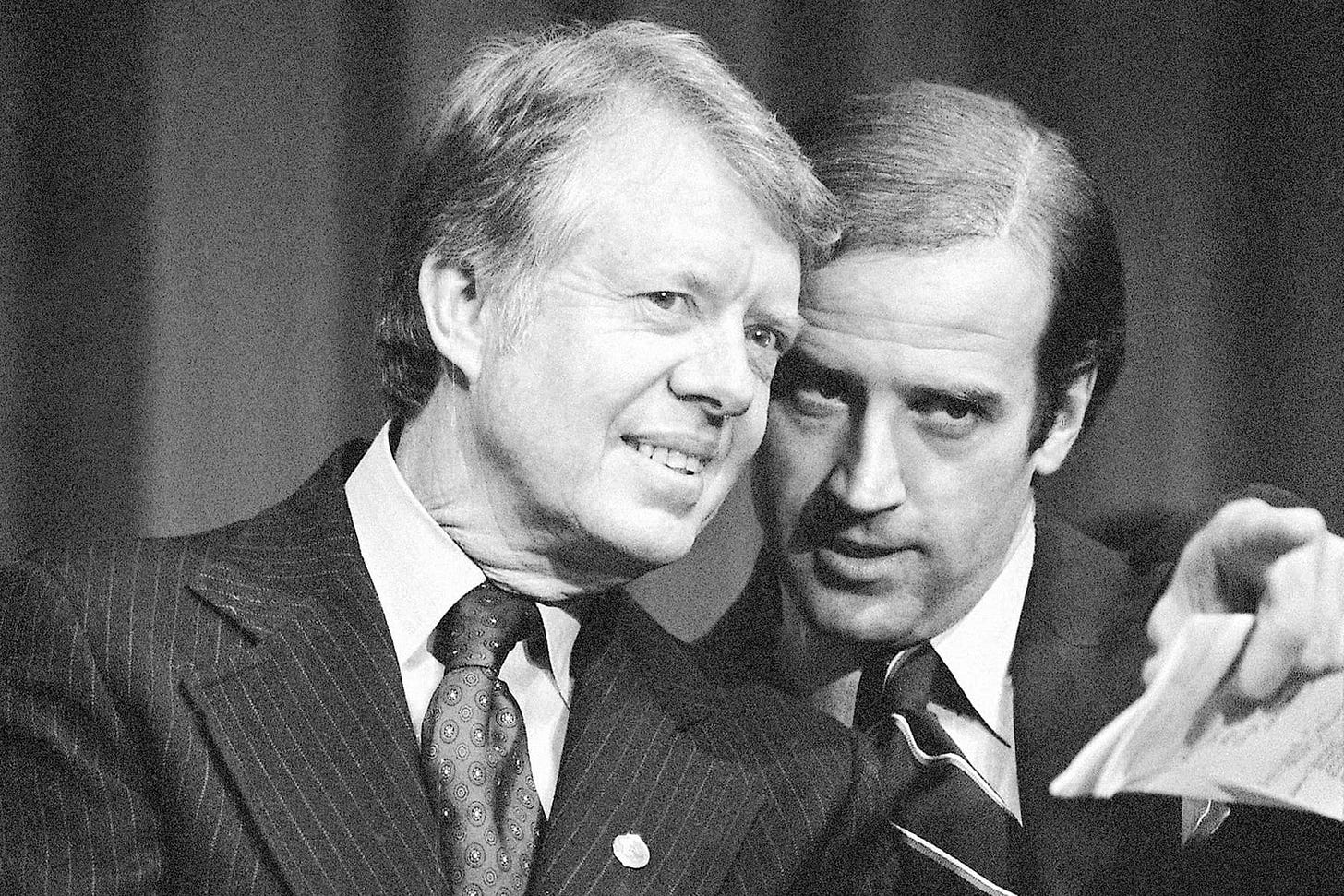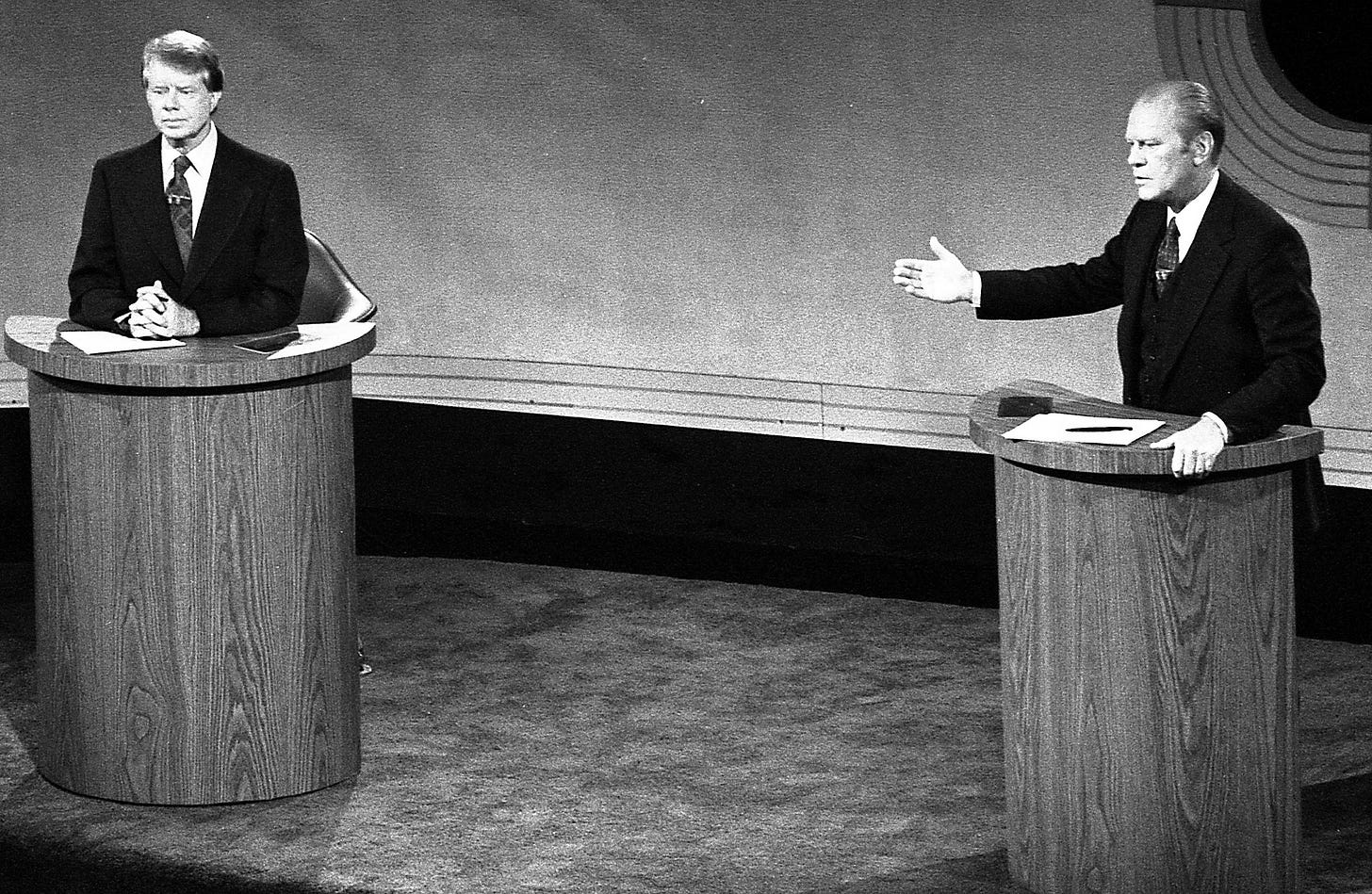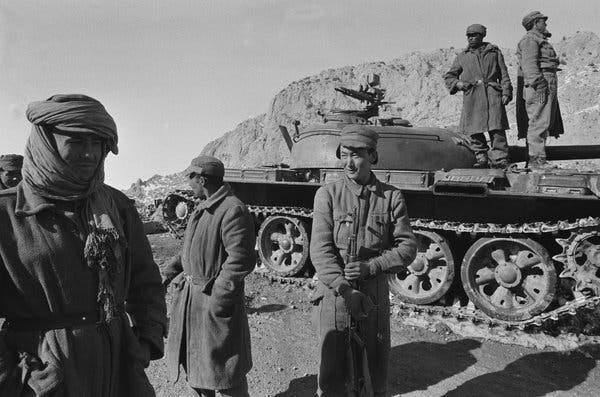Jimmy Carter: Born-Again Cold Warrior
Jimmy Carter’s presidency (1977–1981) significantly transformed U.S. foreign policy. Carter himself evolved from an idealistic leader into a pragmatic Cold Warrior. Rising to power as a political outsider, Carter presented himself as a man of the people, untainted by the corruption of the Nixon presidency. His emphasis on integrity and human rights initially framed his administration’s international agenda, but the realities of Cold War geopolitics led to strategic recalibration to a more hardline approach.
The Rise of an Idealistic Leader
Jimmy Carter was born in 1924 in the tiny town of Plains, Georgia. In 1941, he left to attend Georgia Tech and then the US Naval Academy to study engineering, graduating in 1946. In 1953, after a brief career in the Navy as a nuclear engineer, Carter took over his family’s small peanut farm after his father’s death. He grew it into a successful operation, setting the stage for a Georgia State Senate run in 1963. His was a rare voice in the southern Democratic Party supporting racial integration, though it was quiet given segregationist sentiments in his state.
In his successful 1970 run for governor, Carter campaigned to the right of his primary opponent as a populist who courted the support of segregationists. He changed tact in his inauguration speech, proclaiming that "the time for racial discrimination is over.” As governor, he funded education and community programs and publicly supported racial integration, integrating the Georgia state workforce and adding portraits of prominent black leaders to the capitol building.
He entered the 1976 presidential race as a populist reformer distant from a scandal-plagued Washington. Carter promised an ethical and transparent government as an alternative to the realpolitik strategies of prior administrations. His opponent, President Gerald Ford, was tainted by his association with Nixon and was the first president never to have won a national election. He was the House Minority Leader when he was nominated by Nixon and confirmed in the Senate as the vice president after the resignation of Spiro Agnew in a bribery scandal. Ford became president after Nixon’s resignation in 1974.
Carter won a 297-240 electoral college victory with a 2% popular vote lead. Carter’s ascent to the presidency was rooted in his image as a common man who could restore public trust in the wake of the Watergate scandal Upon taking office, Carter made human rights the cornerstone of U.S. foreign policy, cutting or restricting military aid to regimes in Nicaragua, Chile, Brazil, and Argentina due to their human rights abuses. This stance signaled that American foreign policy would prioritize moral considerations over expedient alliances.
The Realities Diplomacy
Jimmy Carter’s foreign policy legacy in the Middle East is defined by two pivotal events: the Camp David Accords and the Iranian Revolution. The 1978 Camp David Accords were a historic diplomatic breakthrough where Egypt formally recognized Israel in exchange for the return of the Sinai Peninsula. This marked the first peace treaty between Israel and an Arab state and remains a cornerstone of Carter’s legacy.

However, the agreement was met with backlash in the broader Arab world, where it was seen as a betrayal of the Palestinian cause. This would be a consistent theme with Carter’s idealistic approach, which often ran into the messy realities of global politics and led to inconsistent application of his stated principles.
The Iranian Revolution of 1979 was one of those messy realities. The overthrow of the U.S.-backed Shah and the rise of Ayatollah Khomeini and his Islamic republic transformed a key ally into a hostile theocracy bent on humiliating the United States. The crisis reached its zenith with the storming of the U.S. embassy in Tehran and the subsequent hostage crisis, where 52 Americans were held captive for 444 days. Carter was caught off guard by the revolution’s scale and speed. After months of false starts, an agreement was reached to trade cash for hostages. However, in a final slap to Carter, the hostages were released hours after Reagan was sworn in.
Despite this setback, Carter’s approach did meet with some minor success. He did negotiate nuclear arms reductions. He normalized relations with the People’s Republic of China in 1979, a major step in realigning U.S. strategy in Asia and driving a wedge between the Chinese and the Soviet Union. In Latin America, he negotiated the Torrijos-Carter Treaties, ensuring the eventual transfer of the Panama Canal to Panamanian control. These actions demonstrated his ability to balance ethical principles with strategic imperatives.
Born-Again Cold Warrior
Jimmy Carter’s presidency towards the Soviet Union initially emphasized diplomacy and détente but gradually became more assertive. Early in his term, Carter sought to reduce tensions, but reassessed his approach after the Soviet invasion of Afghanistan in 1979. In a dramatic about-face, he implemented a series of hawkish policies including economic sanctions, a grain embargo, a U.S.-led boycott of the 1980 Moscow Olympics.
Carter also announced the Carter Doctrine, declaring that the U.S. would use military force to defend its interests in the Persian Gulf against Soviet encroachment, These actions signaled a pivot away from cooperation and toward deterrence, laying the groundwork for the renewed Cold War tensions that would define the 1980s.
“An attempt by any outside force to gain control of the Persian Gulf region will be regarded as an assault on the vital interests of the United States of America, and such an assault will be repelled by any means necessary, including military force.”- Jimmy Carter, SOTU 1980
Carter’s administration began arming Afghan mujahideen fighters to counter Soviet forces in Afghanistan. This policy later expanded under Ronald Reagan, laid the groundwork for significant U.S. involvement in the region. including the formation of the Rapid Deployment Joint Task Force, which later evolved into U.S. Central Command (CENTCOM).
While these actions checked further Soviet aggression, they led to the rise of Islamist extremist groups; among the mujahideen was a young Osama bin Laden. Carter’s shift to a more confrontational posture demonstrated his ability to adapt to changing geopolitical realities, though it went against his stated idealistic philosophy.
By the end of his presidency, Jimmy Carter’s increasingly aggressive stance toward the Soviet Union alarmed Soviet leaders, who began to see him as unpredictable and dangerously confrontational. In his last year in office, he did not meet with Soviet leaders, called for defense budget increases, and withdrew the SALT II treaty from Senate consideration. This amounted to a policy of deterrence with no diplomacy.
The Kremlin viewed Carter’s actions as escalating Cold War tensions, and viewed him as “dangerous and unpredictable”. Ironically, despite Ronald Reagan’s staunch anti-communist rhetoric, Soviet officials considered him more predictable and believed his ideological clarity might facilitate pragmatic negotiations. This highlights the paradox of Carter’s legacy: he is remembered as feckless and weak on foreign policy while his hardline policies, often credited to his successor, checked Soviet expansionism and laid the groundwork for the end of the Soviet empire less than a decade later.
Further Reading
Brands, Hal. "How Jimmy Carter Changed American Foreign Policy." Foreign Affairs, March/April 2023. https://www.foreignaffairs.com/united-states/how-jimmy-carter-changed-american-foreign-policy/.
Lederer, Edith M. "Carter's Quest for Mideast Peace Didn't End with Camp David." AP News, February 18, 2023. https://apnews.com/article/carter-mideast-legacy-camp-david-af2fbf95bfac2c1ebb8df5a67fcbeb2b/.
Harris, Nigel. "President Jimmy Carter Obituary: Best Ex-President America Ever Had." The Times, February 23, 2023. https://www.thetimes.co.uk/article/president-jimmy-carter-obituary-best-ex-president-america-ever-had-wqql7r0pj/.
Sayle, Murray. "Europe's View of the Carter Doctrine." The Christian Science Monitor, June 4, 1980. https://www.csmonitor.com/1980/0604/060439.html/.







